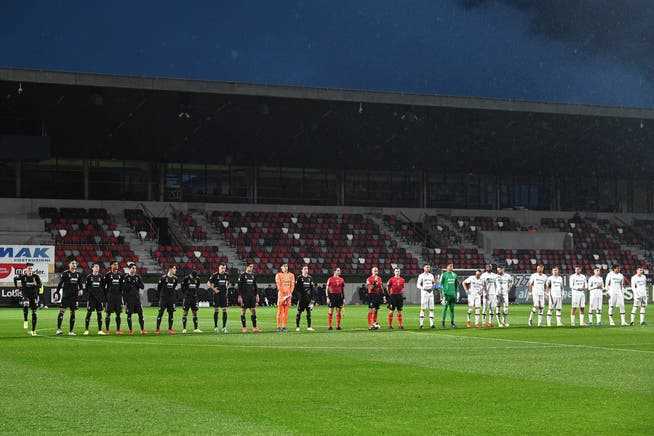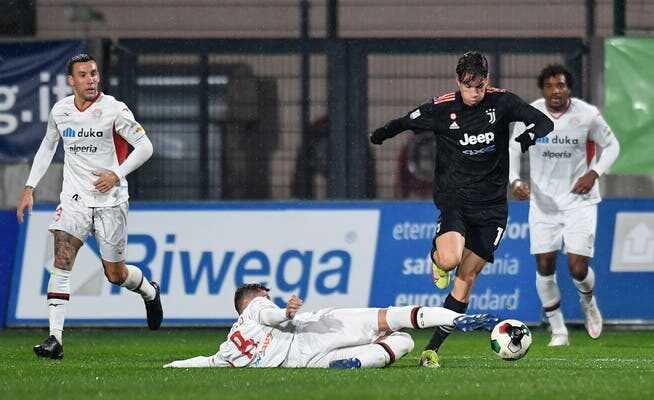For the first time since 1948, the Autonomous Province will be part of the second-highest Italian league next season. FC Südtirol is seen as a bridge builder in a field of tension between the different ethnic groups – and yet there have also been polemics about bilingualism.
Scene from a cup game between FC Südtirol (in white) and the U-23 team from Juventus Turin.
Whoever thinks of South Tyrol might think of wine routes or hiking trails. Or snack plates with sausage and Schüttelbrot. You think less about football. Unless the German national team prepares for the World Cup in the so-called Sportzone Rungg in Eppan.
But now a sensation has happened: FC Südtirol has been promoted to Serie B. Chroniclers write that next season the Autonomous Province will belong to the second highest Italian football league for the first time since 1948. At that time, AC Bozen played in this league, the fusion construct FC Südtirol did not exist for a long time.
The record with which FC Südtirol has achieved its sporting success is impressive: 38 games, 90 points, only 9 goals conceded. The team won 13 times 1-0. Goalie Jack Poluzzi once failed to concede a single goal for more than 1000 minutes. But soon he could face other caliber players – for example the former world goalkeeper Gianluigi Buffon, who at 44 is a captain at Parma.
A TUTTO VOLUME • AT FULL VOLUME ? pic.twitter.com/gh58bd77So
— FC Südtirol (@fclubsuedtirol) April 29, 2022
A thousand kilometers by plane to Apulia – soon it will be to Calabria
FC Südtirol is therefore facing an adventure – and long journeys. The northern Italians got a foretaste last Saturday when they competed in Bari, a thousand kilometers away, as part of the Serie C Supercup. In the morning they flew to Apulia, in the afternoon the game took place. And soon it will even go as far as Calabria.
FC Südtirol will be an underdog. The annual budget was recently five million euros, according to industry insiders it was three times higher for some competitors. But you will probably feel comfortable playing the exotic outsider at FC Südtirol. In the Autonomous Province, people are used to the fact that the clocks tick differently than in the rest of Italy. And strength can be drawn from the effect of being a Gallic village, proud of its independence.
When the provincial governor, an envoy of the South Tyrolean People’s Party, congratulated the team during training, he praised their members as “ambassadors of the qualities” that the South Tyroleans stand for, citing “correct action, determination and commitment, without the impression of arrogance to awaken”.
But as is usual in modern professional football, FC Südtirol is not an association of former schoolmates. There are just five players in the squad who actually come from South Tyrol. The team speaks more Italian. The official language in management, on the other hand, is German – as it is for two-thirds of the South Tyrolean population.
Entusiasmo, passione, calore: il nuovo ‘Druso’ al gran completo ?
Enthusiasm, passion, enthusiasm: the new Drusus Stadium in all its glory ?
? Mercury Studio pic.twitter.com/Odk0avng7H
— FC Südtirol (@fclubsuedtirol) April 22, 2022
The association creates identification to a large extent through its proximity to local businesses. The sponsors’ gallery on the website features more than 150 company names, including everything from window builders to mountain hut operators. Proper support is provided by the largest brewery in the region. She has also been the club president for six months.
Such a broadly based club model is actually more familiar from the German Bundesliga than from Calcio, in which some clubs are run by patriarchs or wealthy families in a rather arbitrary manner. The red and white coat of arms of the South Tyroleans is strikingly similar to that of FC Bayern Munich – it is not for nothing that they have committed themselves to sensible management.
There are even two stadium speakers
FC Südtirol is also often seen as a bridge builder between the different ethnic groups in its region. And especially at the home games, the connection between peoples seems to be thriving. The audience in the grandstands is mixed. There are even two stadium speakers; the announcements will be made in both German and Italian.

FC Südtirol has found a new home in Bolzano, the capacity of the stadium has been expanded to 5500 seats.
And yet the bilingualism has also given rise to polemics. For a few years, the upper part of the club’s coat of arms has read “FC Südtirol”. The Italian name for the region, «Alto Adige», has been removed. Alex Raffeiner, who follows the club for the newspaper “Dolomiten”, says: “Those responsible wanted to strengthen the South Tyrol brand. In return, one accepts that in the rest of Italy people still often speak of ‘South Tyrol’ because they have trouble with the umlaut there.”
In return, the names of the provincial capital were used in the coat of arms in both main languages, “Bolzano” and “Bozen”. “A tribute to the city,” as Raffeiner explains, “because FC have found a home here and have become very popular with their Italian residents.”
The club once had to move from Brixen to Bolzano, because in South Tyrol there is only a stadium in the capital that is able to meet the demands of professional football. Its capacity was recently expanded to 5,500 seats and it is named after Drusus, a politician and military leader in the Roman Empire. There could not have been a better place for FC Südtirol to start a campaign from here and conquer Calcio.
